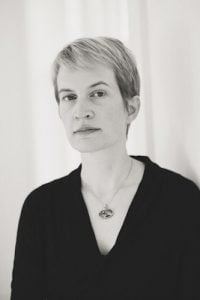 Stephanie Carpenter has published an omnibus book review in the Fall 2018 issue of The Missouri Review. Her piece, “The End of the World as We Know It: Four Novels of Climate Change,” considers new novels by Louise Erdrich, Jenni Fagan, Paul Kingsnorth and James Bradley. Carpenter will again teach Literature and the Environment (HU 3508) in Fall 2020.
Stephanie Carpenter has published an omnibus book review in the Fall 2018 issue of The Missouri Review. Her piece, “The End of the World as We Know It: Four Novels of Climate Change,” considers new novels by Louise Erdrich, Jenni Fagan, Paul Kingsnorth and James Bradley. Carpenter will again teach Literature and the Environment (HU 3508) in Fall 2020.
Paige is a strategic communications professional specializing in higher education, cultural programming, and community engagement. She is an expert in crafting data-driven campaigns that are accessible to diverse audiences. A proud Michigan Tech alum, Paige earned her BS in Scientific and Technical Communication, along with minors in media production and psychology. She resides in Green Bay with her family.
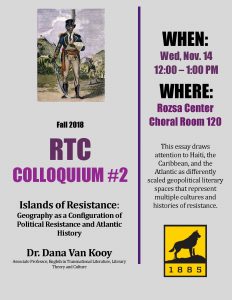 Please join the Department of Humanities for a Rhetoric, Theory and Culture Colloquium on Wednesday, November 14 titled “Islands of Resistance.” Dana Van Kooy, associate professor of english in transnational literature and literacy theory and culture, will present “Islands of Resistance: Geography as a Configuration of Political Resistance and Atlantic History” (see abstract below). This essay draws attention to Haiti, the Caribbean, and the Atlantic as differently scaled geopolitical literary spaces that represent multiple cultures and histories of resistance.
Please join the Department of Humanities for a Rhetoric, Theory and Culture Colloquium on Wednesday, November 14 titled “Islands of Resistance.” Dana Van Kooy, associate professor of english in transnational literature and literacy theory and culture, will present “Islands of Resistance: Geography as a Configuration of Political Resistance and Atlantic History” (see abstract below). This essay draws attention to Haiti, the Caribbean, and the Atlantic as differently scaled geopolitical literary spaces that represent multiple cultures and histories of resistance.
Please join us 12 p.m. (noon) Wednesday, November 14 in Rozsa Center room 120 (choral room).
Abstract:
Islands of resistance. The phrase commonly refers to isolated pockets of organized and oppositional force. Significantly, when interpreting the phrase, the emphasis falls more on the geographical features of an island than on the refusal to comply. The geographical imagery encircles and confines resistance: limiting its effectiveness to a series of singular actions or to a small, containable collective movement. In the cultural imaginary, the island represents a point of stasis in the midst of an immensely larger—very fluid and indomitable—natural force. However, the island’s characteristics—its isolation, its remoteness from everywhere else, and its unique ecology—also produce a synecdoche: the world is an island. What I find relevant here is how geographical markers reconfigure the politics of the phrase, both positively and negatively.
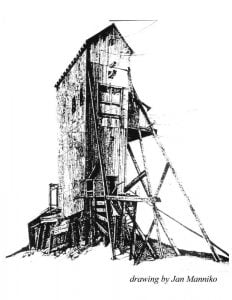
Students from Stefka Hristova‘s Fundamentals of Digital Imaging course will be exhibiting their work at the Copper Country Community Arts Center’s “Shaft” exibit beginning Friday. The exhibit, held in the Kerredge Gallery, is a non-juried community exhibition inspired by mining in the Copper Country; the physical signs of its presence or the effect it has had on the area and its people.
The opening reception will be held on Friday, November 9 at 6 p.m. at the Arts Center. The public is invited to attend and vote on their favorite pieces. The exhibit will continue through November 30.
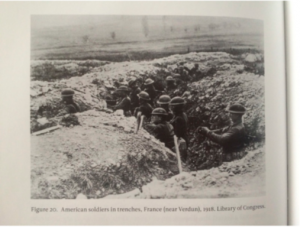 World War I & the Copper Country (WW1CC) will commemorate the Armistice of Nov. 11, 1918. The public will be welcomed with a bagpipe performance of “The Flowers of the Forest” and the distribution of paper poppies starting at 10:50 a.m. Sunday (Nov. 11) at the World War I Firing Trench (US-41 and MacInnes Drive).
World War I & the Copper Country (WW1CC) will commemorate the Armistice of Nov. 11, 1918. The public will be welcomed with a bagpipe performance of “The Flowers of the Forest” and the distribution of paper poppies starting at 10:50 a.m. Sunday (Nov. 11) at the World War I Firing Trench (US-41 and MacInnes Drive).
The commemoration will begin promptly at 11 a.m. when bells will be synchronized to ring for 30 seconds. The Michigan Tech Joint Color Guard, consisting of Air Force and Army ROTC cadets, will present the colors. The program will include singing the National Anthem, a poem recitation, a prayer offering and a firing party (21-gun salute) by the Veterans of Foreign Wars, Hubbell post.
Taps will be played by a formation of local student buglers, followed by the retirement of the colors. The commemoration will conclude by inviting guests to drop their poppies into the trench as they disperse.
Refreshments will be offered in the Wads Annex preceding and following the commemoration. In the event of inclement weather, the commemoration will move into the Wads Annex. Free parking will be available in any of the Michigan Tech lots directly opposite the trench on US-41.
 Andrew Fiss has published a research article titled “Structures of Antifeminism: Drugs and Women’s Education in the Texts of Dr. Clarke” in the rhetoric journal Peitho. The article used rare books from the Countway Library of Medicine at Harvard to track the historical roots of a pervasive antifeminist argument that has kept women from higher education since the Civil War Era. The article indicates how the structure of this argument came from early classes in pharmacy delivered by Boston doctor Edward H. Clarke in the 1850s-60s, popularizing discrimination through (implicitly, structurally) presenting women’s education as a dangerous drug that could be overused/abused.
Andrew Fiss has published a research article titled “Structures of Antifeminism: Drugs and Women’s Education in the Texts of Dr. Clarke” in the rhetoric journal Peitho. The article used rare books from the Countway Library of Medicine at Harvard to track the historical roots of a pervasive antifeminist argument that has kept women from higher education since the Civil War Era. The article indicates how the structure of this argument came from early classes in pharmacy delivered by Boston doctor Edward H. Clarke in the 1850s-60s, popularizing discrimination through (implicitly, structurally) presenting women’s education as a dangerous drug that could be overused/abused.
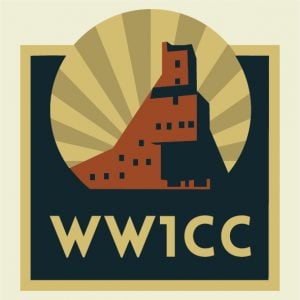 A talk on Copper Country Mothers during World War I by Patty Sotirin will take place tonight (Nov. 6) at the Carnegie Museum of the Keweenaw. Doors open at 6 p.m., and the talk begins at 6:15. Refreshments will be served. This event is part of World War I & the Copper Country.
A talk on Copper Country Mothers during World War I by Patty Sotirin will take place tonight (Nov. 6) at the Carnegie Museum of the Keweenaw. Doors open at 6 p.m., and the talk begins at 6:15. Refreshments will be served. This event is part of World War I & the Copper Country.
Sotirin’s talk explains how mothers of sons in military service were critical figures in the Copper Country’s participation in the Great War. The war was a personal challenge for mothers, but made them public figures as well. Highlighting several local mothers whose boys went to war, Sotirin sketches what that experience was like for them based on letters, poems and newspaper stories. Beyond their personal pride and trials, the patriotic citizen mother ready to sacrifice her children for the nation emerged as a public focus for recruitment appeals, servicemen support and national grieving.
Special attention is given to the creation of the Gold Star Mothers and their sojourn at national expense to visit their boys’ graves overseas. Given women’s campaign for the vote and the importance of ethnic identity in the Copper Country, the experiences of mothers here highlight some of the tensions among motherhood, nationalism and citizenship that are still part of our collective story of motherhood and war.
 Join Modern Languages faculty and students from 5 to 6 p.m. Wednesday (Nov. 28) in Walker 134 for a unique celebration of French, German and Spanish holiday traditions. Appearing live will be the French Canadian group, Maple Sugar Folk, as well as Sue Ellen Kingsley and Friends.
Join Modern Languages faculty and students from 5 to 6 p.m. Wednesday (Nov. 28) in Walker 134 for a unique celebration of French, German and Spanish holiday traditions. Appearing live will be the French Canadian group, Maple Sugar Folk, as well as Sue Ellen Kingsley and Friends.
Learn holiday songs in each language for the sing-along and listen to traditional holiday music. Play Christmas Bingo and enjoy a variety of holiday treats from different cultures. No prior language experience required. Families are welcome.
For more information, contact Karin Schlenker.
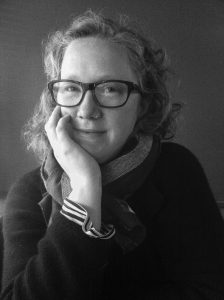 Award-winning fiction writer Diane Cook will give a reading from her work from 4:30 to 5:30 p.m. Tuesday (Nov. 6) in ME-EM 112.
Award-winning fiction writer Diane Cook will give a reading from her work from 4:30 to 5:30 p.m. Tuesday (Nov. 6) in ME-EM 112.
Cook is the author of the story collection Man V. Nature, and was formerly a producer for the public radio show This American Life. Man V. Nature was a finalist for the Guardian First Book Award, Believer Book Award and the Los Angeles Times Art Seidenbaum Award for First Fiction.
Cook’s stories have appeared in Harper’s, Tin House, Granta and elsewhere and have been anthologized in Best American Short Stories and The O. Henry Prize Stories. Cook is the recipient of a 2016 fellowship from the National Endowment for the Arts. A Michigan native, she has served as a National Park volunteer on Isle Royale.
The reading is free and open to the public. A reception and book signing will follow, with books available for purchase at the door.
This event is sponsored by the English Program, Department of Humanities and the Visiting Professor Lecturer/Scholar Series (VPLSS), which is funded by a grant to the Provost’s Office from the State of Michigan’s King-Chavez-Parks Initiative.
 Nancy Henaku, Rhetoric, Theory, and Culture PhD candidate, has published a paper in the African Journal of Rhetoric titled “Rhetoric, Power and Political Crisis: A Rhetorical Discourse Analysis of Ghana’s 2012 Election Petition”.
Nancy Henaku, Rhetoric, Theory, and Culture PhD candidate, has published a paper in the African Journal of Rhetoric titled “Rhetoric, Power and Political Crisis: A Rhetorical Discourse Analysis of Ghana’s 2012 Election Petition”.
Henaku argues that “courtroom discourse during Ghana’s 2012 election petition was not meant to just persuade the panel of judges and that power framed and determined what was significant in the courtroom interactions.”
Discursive construction of power during cross-examinations is complicated by the fusion of ‘legal’ and ‘political’ power which impacts the production of the three modes of proof (ethos, pathos and logos) and ultimately, determines the outcome of the case itself. —Nancy Henaku, RTC PhD candidate
 William De Herder, Rhetoric, Theory, and Culture PhD student, has published a paper in Praxis: A Writing Center Journal in which he discusses Michigan Tech’s own Mulitliteracies Center. The paper is titled “Composing the Center: History, Networks, Design and Writing Center Work.”
William De Herder, Rhetoric, Theory, and Culture PhD student, has published a paper in Praxis: A Writing Center Journal in which he discusses Michigan Tech’s own Mulitliteracies Center. The paper is titled “Composing the Center: History, Networks, Design and Writing Center Work.”
I hope that other centers might learn from our experience and consider deploying similar strategies to question and reflect on how their work can accommodate new technological realities and pursue social projects. —William De Herder